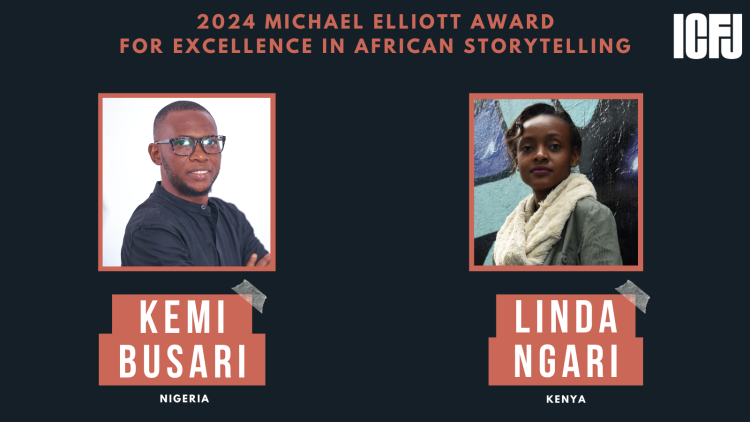A journalist who investigated a potentially deadly concoction sold in the streets of Nigeria and another who chronicled a fight for abortion rights in Kenya are the 2024 winners of the Michael Elliott Award for Excellence in African Storytelling.
Kemi Busari’s winning story, “Baba Aisha, Nigeria’s fake ‘doctor’ cashing out on deadly concoction that cures nothing,” investigates a low-end herbal product that is sold in the streets of Abuja, Nigeria, and advertised as a fix for common diseases. Busari, who is an editor at DUBAWA, collaborated with a team of scientists to test the concoction, exposing how harmful it can be.
Linda Ngari, a freelance Kenyan journalist who specializes in open-source investigations and data journalism, led the reporting on and presented a gripping documentary, “Breaking the Silence: Abortion Rights in Kenya,” for BBC News Africa. Ngari, who monitors dis-and misinformation trends across Africa, investigates a hidden crisis that has led to an estimated seven Kenyan women dying every day from unsafe abortions, with many more facing life-altering complications.

The Michael Elliott Award aims to advance the careers of emerging journalists in Africa who work to strengthen people’s voices and improve their well-being. The award is given out by the International Center for Journalists (ICFJ), in partnership with the ONE Campaign and the Elliott family. Busari and Ngari will receive a cash prize and take part in a customized professional development program at the London headquarters of The Economist, a generous long-time partner of the award.
“As a journalist, I strive daily to uncover hidden truths, hold power to account, and help keep the public safe and heard – and my Baba Aisha investigation aims to do just that,” Busari said. “I extend my heartfelt gratitude to my colleagues for their unwavering assistance during the reporting process, and to the scientists who generously shared their expertise and time.”
Ngari said receiving the award for a story on a topic considered taboo in Kenya was encouraging, noting: “The decision to keep or not keep an unplanned pregnancy is very personal and not easy, and my heartfelt gratitude goes to the women who trusted us to share their stories with the world." She also thanked the team behind the documentary, a collaboration between openDemocracy, True Vision and BBC Africa Eye.
“The documentary was made possible with the help of many talented people from across the globe,” Ngari said. “I'd like to thank the executive producer Lydia Namubiru, who commissioned the film; director Zoe Flood; producers Rael Ombuor and Seyi Rhodes; executive producers Brian Woods and Peter Murimi; as well as everyone else at openDemocracy, True Vision and BBC Africa Eye who played a part in the process.”
“I warmly congratulate Kemi Busari and Linda Ngari on their riveting and deeply researched stories, that each shine a light on challenges in healthcare in Africa,” said Emma Oxford, Michael Elliott’s widow. “I am so grateful to the many individuals and institutions who honor Michael with their continued support for the program. And I thank all involved in its success, especially my fellow judges, ICFJ, ONE, and The Economist. I know that Kemi and Linda will have transformative professional experiences in London, and I am delighted that The Economist will host them there.”
“We had an incredible field of entries in this year’s Michael Elliott Award and two outstanding winners,” said Lionel Barber, former editor of the Financial Times and author of “Gambling Man” (a biography of Japan’s Masayoshi Son), who chaired the international panel that selected Busari and Ngari from among 298 applicants.
In addition to this year’s winners, the award judges would like to recognize the two runners-up as a sign of how strong the field of candidates was this year. Nakisanze Segawa wrote a beautiful story about a land dispute on the outskirts of a renowned forest in Uganda. Gideon Sarpong investigated the import of old car parts from Europe to Ghana that don’t meet the EU’s own environmental regulations.
“In a high-quality field, we would like to highlight Nakisanze Segawa’s reporting which contained invaluable historical context in Uganda, while Gideon Sarpong’s expose should be a must-read in all EU countries which tout their green credentials,” said Barber.
The Elliott Award was established in 2016 in honor of former ICFJ board member Michael Elliott, who served as a top editor at The Economist, Newsweek, and Time before becoming CEO of ONE.
The 2024 award judges included:
Lionel Barber, Chair, Former Editor of the Financial Times and Author of “Gambling Man”
Matthew Bishop, Nonresident Senior Fellow, Global Economy and Development, Brookings Institution
Jackie Chimhanzi, CEO, African Leadership Institute
Anne Paisley, Associate Director, ONE
Catherine Gicheru, ICFJ Knight Fellow and Director of The Africa Women Journalism Project
Abubakar Ibrahim, Features Editor, Daily Trust and 2018 Elliott Award Winner
Rik Kirkland, Senior Advisor, McKinsey and Company, and ICFJ Board Director
Sharon Moshavi, President, International Center for Journalists
Emma Oxford, author of “At Least We Lived”
Dorcas Wangira, Feature Writer, Citizen Television and 2019 Elliott Award winner
About the Michael Elliott Award
Michael Elliott, a passionate writer and editor with a gift for unraveling complex issues, shone a light on global development issues and the people at their center. A longtime board member of ICFJ, Elliott championed great journalism as a tool for empowerment. As ONE’s CEO, he lobbied to improve the lives of all Africans. Shortly before his untimely death in 2016, Elliott spoke of his dream to establish an award that would bring together his belief in great journalism with his commitment to progress in Africa.
Previous Elliott Award winners include Mercy Juma and Dorcas Wangira of Kenya; Bernadette Vivuya of the Democratic Republic of the Congo; Khalid Bencherif of Morocco; Nalova Akua of Cameroon; Farai Shawn Matiashe of Zimbabwe; and Abubakar Ibrahim, Kiki Mordi, Zainab Bala, and Adekunle Adebajo of Nigeria. These talented journalists have uncovered child labor in mines, exposed sexual harassment in universities, the fight against female genital mutilation, and more.